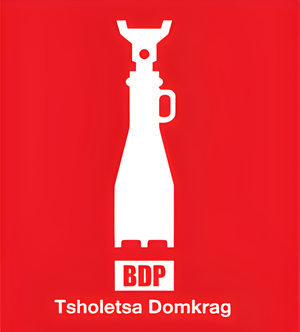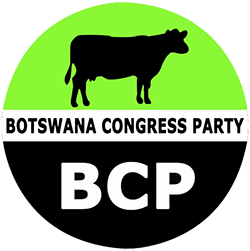Related Research Articles

Botswana is a parliamentary republic in which the President of Botswana is both head of state and head of government. The nation's politics are based heavily on British parliamentary politics and on traditional Batswana chiefdom. The legislature is made up of the unicameral National Assembly and the advisory body of tribal chiefs, the Ntlo ya Dikgosi. The National Assembly chooses the president, but once in office the president has significant authority over the legislature with only limited separation of powers. The Botswana Democratic Party (BDP) rules as a dominant party; while elections are considered free and fair by observers, the BDP has controlled the National Assembly since independence. Political opposition often exists between factions in the BDP rather than through separate parties, though several opposition parties exist and regularly hold a small number of seats in the National Assembly.

The Government of Botswana often abbreviated as GOB, is the union government created by the constitution of Botswana having the executive, parliament, and the judiciary. The Seat of the Government is located in Gaborone, Botswana. The government is led by the president.

The president of South Africa is the head of state and head of government of the Republic of South Africa. The president directs the executive branch of the government and is the commander-in-chief of the South African National Defence Force. Between 1961 and 1994, the office of head of state was the state presidency.

The president of the Republic of Botswana is the head of state and the head of government of Botswana, as well as the commander-in-chief of the armed forces, according to the Constitution of Botswana. Sir Seretse Khama was the prime minister from 1965 to 1966, however he later became president of Botswana, and as of 2024 there have been no prime ministers since.

The Botswana Democratic Party is the governing party in Botswana. Its chairman is the Vice-President of Botswana, Slumber Tsogwane, and its symbol is a lift jack. The party has ruled Botswana continuously since gaining independence from the United Kingdom in 1966. The BDP is sometimes classified as a paternalistic conservative party and is also a consultative member of the Socialist International since 2014, which is a group including many worldwide social-democratic parties.

The Botswana Congress Party (BCP) is a social democratic political party in Botswana. Founded in 1998 as a result of a split from the Botswana National Front (BNF), the party attracted most of the BNF's sitting MPs due to a leadership dispute involving the BNF's leader, Kenneth Koma.

Elections in Botswana take place within the framework of a multi-party democracy and a parliamentary system. The National Assembly is mostly directly elected, and in turn elects the President and some of its own members. The Ntlo ya Dikgosi is a mixture of appointed, hereditary and indirectly elected members.

The Parliament of Botswana consists of the President and the National Assembly. In contrast to other parliamentary systems, the Parliament elects the President directly for a set five-year term of office. A president can only serve 2 full terms. The President is both Head of state and of government in Botswana's parliamentary republican system. Parliament of Botswana is the supreme legislative authority. The President of Botswana is Mokgweetsi Masisi, who assumed the Presidency on 1 April 2018. In October 2019, the 2019 general election was held which saw the return of the Botswana Democratic Party to the power with a majority of 19 seats in the 65 seat National Assembly.

The National Assembly is the sole legislative body of Botswana's unicameral Parliament, of which consists of the President and the National Assembly. The House passes laws, provides ministers to form Cabinet, and supervises the work of government. It is also responsible for adopting the country's budgets. It is advised by the Ntlo ya Dikgosi, a council of tribal chiefs which is not a house of Parliament.

General elections were held in Botswana on 16 October 1999, alongside local elections. The result was an eighth straight victory for the ruling Botswana Democratic Party (BDP), which increased its majority to 33 of the 40 elected seats in the National Assembly.

General elections were held in Botswana on 15 October 1994, alongside simultaneous local elections. The result was a victory for the Botswana Democratic Party (BDP), which had won every election since 1965. However, the elections also saw a strong performance from the Botswana National Front (BNF), which tripled its number of MPs and won all four seats in the capital Gaborone.

The Constitution of Botswana commenced on September 30, 1966.

General elections were held in Botswana on 16 October 2009, alongside local elections, with early voting in 26 polling stations abroad taking place 3 October. The result was a tenth successive victory for the Botswana Democratic Party, which won 45 of the 57 elected seats in the National Assembly.

General and local elections were held in Botswana on 24 October 2014. The result was an eleventh straight victory for the Botswana Democratic Party, which won 37 of the 57 elected seats. Incumbent President Ian Khama was sworn in for a second term on 28 October.

Mokgweetsi Eric Keabetswe Masisi is a Botswana politician who is the fifth and current President of Botswana, serving since 2018. He served as the 8th Vice President of Botswana from 12 November 2014 to 1 April 2018. He was a Member of Parliament in the National Assembly for the Moshupa-Manyana constituency from 2009 to 2018.
Gladys Keitumetse Theresa Kokorwe is a Botswana politician who was the Speaker of the National Assembly from 2014 to 2019. She is a member of the Botswana Democratic Party (BDP).
Slumber Tsogwane is the current Vice President of Botswana and also Member of Parliament for Boteti West. He is the longest serving Member of Parliament of the 12th Parliament of Botswana. He took office on 4 April 2018, succeeding Mokgweetsi Masisi. He is a member of the Botswana Democratic Party.

General elections were held in Botswana on 23 October 2019 to elect MPs and local government councillors. Despite a high profile split in the ruling Botswana Democratic Party (BDP) in May 2019 when former President Ian Khama left the party and switched his support to the new Botswana Patriotic Front, the BDP's vote share increased to almost 53% as the party won 38 of the 57 elected seats in the National Assembly, a gain of one compared to the 2014 elections. The elections were the twelfth straight victory for the BDP.

Philip Parcel Goanwe Matante was a Motswana nationalist and founder of the Botswana People's Party. He was the opposition leader in the National Assembly of Botswana from its establishment in 1965 until his death in 1979.

The 2024 Botswana general election will be held to determine the composition of the 13th Parliament of Botswana as well as local councils across the country. Up for election are 61 seats of the National Assembly as well as 490 local council seats, all elected through the first-past-the-post voting system.
References
- ↑ "First Parliament of Botswana". Parliament of Botswana. Retrieved 2024-04-23.